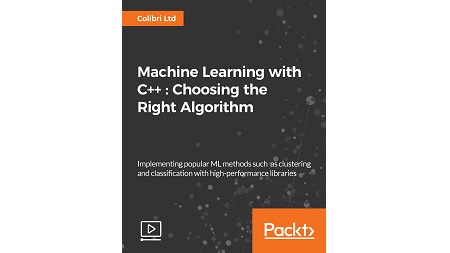
English | MP4 | AVC 1920×1080 | AAC 44KHz 2ch | 1h 34m | 301 MB
Use skills learnt in C++ to build efficient models
Machine Learning is a field of Computer Science that involves the use of various methods for pattern recognition and computational learning from data sources. This tutorial will introduce you to the fundamentals of Machine Learning and show you how you can utilize your C++ skills to build efficient data models.
We start by discussing the suitability of different algorithms for different situations; this often involves inspecting data and then making an informed decision based on prior experience and knowledge. We will then implement popular supervised and unsupervised machine learning algorithms in C++ with the help of practical examples. The coursealso includes videos on tuning and optimizing the model for different use cases, and a quick introduction to neural networks and deep learning.
During the course of this tutorial, you will work with different types of C++ library used for Machine Learning—such as mlpack, Shark, and so on—to solve different kinds of problem. By the end, you will be able to efficiently extend your knowledge of C++ to build a solid foundation in the field of Machine Learning.
This course introduces four new algorithms, from deep learning to unsupervised clustering. First a brief mathematical representation of the algorithms is given; this is to allow the student to get a feel for what the algorithm is doing. We then step through a simple implementation of each algorithm with an intuitive data set to further our understanding of the algorithm.
What You Will Learn
- How to choose an algorithm that suits the situation and objective.
- Be aware of common issues when choosing an algorithm.
- The advantages and disadvantages of a Neural Network.
- The advantages and disadvantages of a Support Vector Machine (SVM).
- The advantages and disadvantages of clustering with Expectation Maximization (EM).
- The advantages and disadvantages of clustering with K – Nearest Neighbours (K-NN).
Table of Contents
01 The Course Overview
02 How to Categorize the Modeled Problem
03 One from Many – Choosing the Algorithm
04 Preprocessing Datasets
05 Why Is It Not Working as Expected – Common Pitfalls
06 Choosing Algorithm Parameters
07 When to Choose a SVM
08 Implementation of a SVM
09 Discussion
10 When Is a Neural Network Appropriate
11 Implementation of a Neural Network
12 Define the Network
13 Train the Network
14 Discussion
15 When to Choose Expectation Maximization
16 Implementing Expectation Maximization
17 Training and Estimation of Parameters
18 Discussion
19 When to Choose a KNN
20 Implementing a KNN
21 Discussion
Resolve the captcha to access the links!